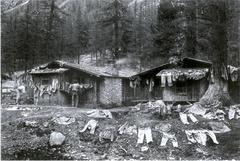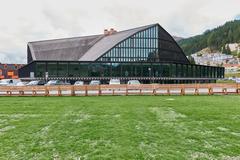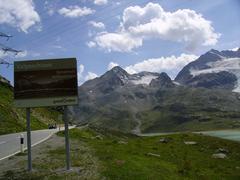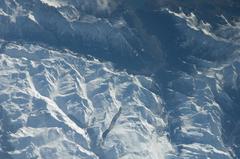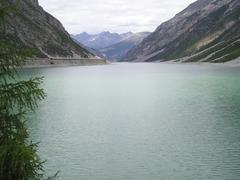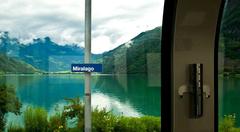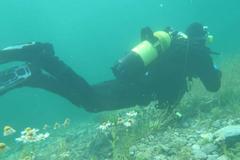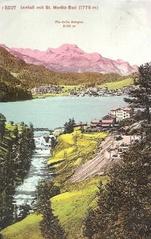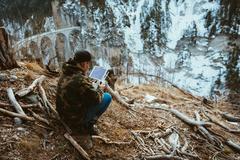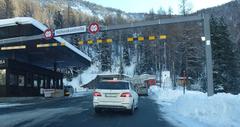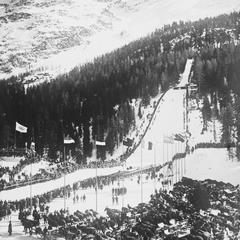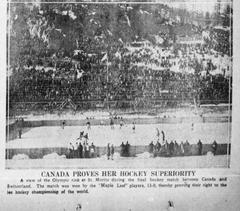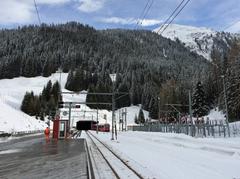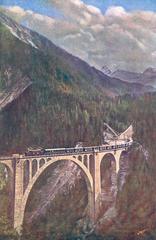
Kropfenstein Castle: Visiting Hours, Tickets, and Travel Guide in Canton of the Grisons, Switzerland
Date: 04/07/2025
Introduction
Perched dramatically on a sheer cliff in the Surselva region of the Canton of the Grisons (Graubünden), Switzerland, Kropfenstein Castle is a rare example of medieval cave castle architecture. Built around 1312 CE, it is ingeniously integrated into the natural rock, using the cliff as a protective rear wall. The castle offers not only breathtaking panoramic views but also a fascinating window into feudal life in the rugged Alpine environment (HeritageDaily; Brightside). Its proximity to Waltensburg/Vuorz makes it a compelling destination for visitors interested in history, architecture, and hiking.
This comprehensive guide details the castle’s history, architectural features, practical visitor information—including visiting hours, ticketing, accessibility—as well as travel tips and nearby attractions to help you plan a rewarding visit to one of Graubünden’s most remarkable historical sites.
Table of Contents
- Introduction
- Historical Overview
- Visiting Kropfenstein Castle: Practical Information
- Nearby Attractions in Surselva and Grisons
- Frequently Asked Questions (FAQ)
- Conclusion and Final Tips
- References
Historical Overview
Origins and Construction
Kropfenstein Castle is a striking example of a medieval cave castle (“Höhlenburg”), constructed around 1312 CE. Its name derives from the Middle High German “Kropf” (outgrowth) and “Stein” (rock), reflecting its integration into a protruding cliff (ShowCaves). The castle’s rear wall is the natural rock face, while the front was built with local Ilanzer Verrucano stone bonded with lime mortar. Originally, the castle probably had two or three timber-floored stories, now lost to time (Per Storemyr).
The Counts of Kropfenstein and Feudal Society
Historical records mention Bürcli von Kropfenstein as an early inhabitant (1335 CE), with the family originating from Luven. The Counts of Kropfenstein played an influential role in the region’s feudal society, overseeing the surrounding lands and contributing to the defense and control of the Surselva valley (SwissCastles).
Life and Defense at the Castle
Kropfenstein Castle’s cliffside location provided formidable natural defense. The main entrance, only about 2 meters wide, opened to a series of rooms following the cliff’s contours. Living quarters, a kitchen, storerooms, and a grand hall were organized within the limited space. Waste disposal was managed through a cliff-edge latrine. While secure, the castle was cold, damp, and difficult to supply—testament to the harsh realities of medieval alpine life (HeritageDaily; Per Storemyr).
Decline and Abandonment
By the 15th century, the noble Kropfenstein line had faded, and the castle was gradually abandoned. The wooden upper structures decayed, leaving the stone shell and the cliff itself. Today, the preserved ruins provide valuable insight into medieval architecture and defensive strategies (ShowCaves).
Historical Significance in Graubünden
Kropfenstein Castle stands out among the many castles of the Surselva valley due to its cliffside, cave-like design and the resourcefulness of its builders. It exemplifies the adaptations of medieval nobility to Graubünden’s mountainous terrain and turbulent history (Per Storemyr).
Visiting Kropfenstein Castle: Practical Information
Visiting Hours and Tickets
- Admission: Free of charge. No tickets are required.
- Opening Times: The castle is an open-air ruin, accessible year-round. However, the best visiting season is May to October when trails are safest and clear of snow (Surselva Info).
- Guided Tours: No regular guided tours. Local tourism offices may occasionally organize guided hikes or cultural events (Graubünden Tourismus).
How to Get There and Accessibility
- Location: Near Waltensburg/Vuorz in the Surselva valley.
- By Car or Public Transport: Reach Waltensburg via Ilanz (connected by Swiss Federal Railways SBB). PostBus service links Ilanz to Waltensburg.
- On Foot: From Waltensburg, follow well-marked hiking trails (~1.5–2 hours round-trip). The trail is moderately challenging with some steep, rocky sections.
- By Bike: E-bike and gravel bike options are available, with charging stations in Brigels and Waltensburg (Graubünden Tourismus).
- Accessibility: The castle is not wheelchair accessible due to steep, uneven terrain. The hike is not recommended for visitors with limited mobility or young children.
Facilities and Refreshments
- On-site: No facilities (toilets, water, or shelter) at the castle itself.
- Nearby: Waltensburg and Brigels offer restaurants, cafés, hotels, and public restrooms. Hotel Ucliva in Waltensburg is a popular refreshment stop (Graubünden Tourismus).
Travel Tips
- Best Time to Visit: May to October; avoid winter due to hazardous, icy trails.
- What to Bring: Sturdy hiking boots, layered clothing, water, snacks, camera, and a map or GPS.
- Safety: Always check the weather forecast. Carry a fully charged mobile phone and basic first aid kit. Emergency numbers: 144 (medical), 1414 (mountain rescue/REGA), 112 (international).
- Etiquette: Respect the protected ruins—do not climb, move stones, or leave litter. Dogs are allowed but must be leashed.
Nearby Attractions in Surselva and Grisons
- Brigels: Traditional alpine village with dining options and a bathing lake.
- Ruina Grotta: Another historic ruin accessible via local trails.
- Luven: Historic village connected to the Kropfenstein family.
- Viamala Gorge: A dramatic natural gorge with walkways and staircases for exploration (Viamala Tourism).
- Domleschg Valley: Renowned as the “Valley of Castles,” with several accessible medieval ruins (Domleschg Tourism).
- Chur: Switzerland’s oldest city with a charming old town and cultural attractions (Chur Tourism).
The Engadine Valley and Notable Villages
- Guarda, Zuoz, Sils im Engadin/Segl, Pontresina, Celerina/Schlarigna, Samedan, Scuol, Ardez: Each offers unique historical architecture, cultural festivals, and access to hiking and outdoor activities (Touring Switzerland).
Frequently Asked Questions (FAQ)
Q: Is there an entrance fee for Kropfenstein Castle?
A: No, the castle is free to visit and open year-round.
Q: What are the visiting hours?
A: The site is an open-air ruin; visit during daylight hours. Best season: May–October.
Q: Are regular guided tours available?
A: No regular tours, but check Surselva Info for updates on special events.
Q: Is the castle accessible for people with disabilities?
A: No, due to the steep, rocky trail.
Q: Are dogs allowed?
A: Yes, dogs are welcome but must be on a leash.
Q: What should I bring?
A: Hiking boots, water, snacks, layered clothing, and a camera.
Conclusion and Final Tips
Kropfenstein Castle is a truly unique historical site, combining dramatic cliffside architecture with the natural beauty of the Surselva valley. Visiting is free and open to all who are prepared for a moderately challenging hike. Plan your visit between May and October, check the weather, and bring appropriate gear for safety and comfort.
Combine your trip with visits to nearby villages, ruins, the Viamala Gorge, or the Engadine valley for a deeper appreciation of Graubünden’s rich cultural landscape. For the latest updates on events, trail conditions, and visitor tips, consult local tourism resources and consider downloading the Audiala app for offline maps and audio guides.
References
- Kropfenstein Castle: History, Visiting Hours, and Travel Tips for Graubünden’s Unique Cave Castle, HeritageDaily
- Would You Have Liked to Live Here? At Kropfenstein Medieval Cave Castle, Per Storemyr
- Kropfenstein Castle Overview, SwissCastles
- Discover Kropfenstein Castle: A Guide to History, Architecture & Visitor Information, Brightside
- Kropfenstein Castle Visiting Hours, Tickets, and Guide to Surselva Historical Sites, Surselva Info
- Graubünden Tourism Official Site
- Waltensburg/Vuorz and Kropfenstein Castle, Cityseeker
- Touring Switzerland: 8 Most Beautiful Villages in Engadine
- Viamala Tourism: Viamala Gorge
- Domleschg Tourism
- Chur Tourism


